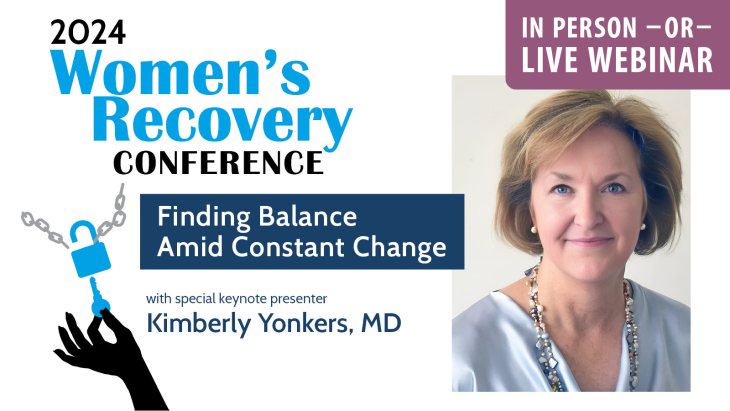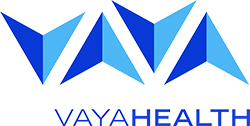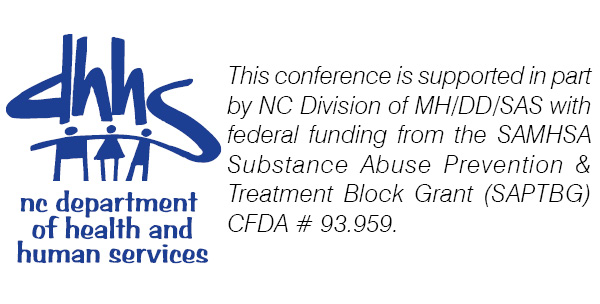2024 Women's Recovery Conference:
Finding Balance Amid Constant Change

Location
Dates & Times
Contact
Do you have event related questions or need help with registration?
This is the 38th year of the Women's Recovery Conference. The 2024 conference offers up to 15.5 credit hours with a variety of credit options.
The entire conference is designed to provide tools that help heal and empower women in recovery, foster stress resilience in a time of unprecedented change, promote collaboration, build trust, and maintain clinical excellence. In the ever-changing environment of caregiving, this is key information all providers must know to overcome current challenges, improve client outcomes, and to promote overall women's health through sustained recovery. Fresh, gender-responsive approaches are taken on mandatory topics such as supervision, ethics, HIV, STIs, and bloodborne pathogens. The conference also offers a choice of innovative care modalities that frontline providers may implement to motivate and empower women, while optimizing balance on the inevitably precarious path of recovery. Information is offered on rewiring the female brain for recovery, medications for opioid use disorder, strategies for harm reduction, and reduction of unintentional self-sabotage. This conference emphasizes culturally-appropriate care, the fostering of strong communities, and the enhancement of physiological, perinatal, and maternal support for women in recovery.
Accommodations
DoubleTree by Hilton Hotel Asheville - Biltmore115 Hendersonville Road, Asheville, NC 28803
Reservations: 828-274-1800 or book online here.
Rate of $136.00 plus taxes and fees
Book by: April 1, 2024
2024 Women's Recovery Conference.
To apply for a MAHEC scholarship for this event, please click here.
There are a limited number of scholarships available through MAHEC. If you have received a registration discount code already, you do not need to apply.
The deadline is 8 AM on March 10, 2024.
The Preconference on Wednesday, May 3rd offers opportunities for both new and advanced practitioners.
Attendance Options:
One-day, two-day, and three-day options are available, with options for "Wednesday Preconference Only" registration, "Thursday Only" registration, or "Friday Only" registration. The event is designed with both In-Person and Live Webinar coverage and direct online access to presenters, allowing for the provision of mental health credits which are classified the same as "live." The live webinar format also serves to assist practitioners who are unable to get away from their practice and who need to receive vital North Carolina updates to inform care.
Please note that all session times listed below are in Eastern Standard.
The Preconference on May 1st begins at 9:00 am and ends at 4:30 pm, offering opportunities for both new and advanced practitioners.
Morning choices:
- Rewiring for Recovery
- Ethical Obligations in a World of Change
Afternoon choices:
- Empowering Women in Recovery: Peer Support Supervision Strategies
- "Harm Reduction 101"
The Main Conference, on May 2nd and 3rd, opens at 9:00 am on Thursday, May 2nd, with a Keynote Speech by Kimberly Yonkers, MD titled, "Pregnancy and After Delivery: A Challenging Time of Change."
Track One on Thursday, May 2nd is a 4.5-hour track that features two relevant sessions:
- The Argument: Releasing Ambivalence and Self-Sabotage
- HIV/STI Updates for Substance Use Professionals
Track Two, on Thursday, May 2nd, is a jam-packed 4.0-hour track inspired by DHHS MH/DD/SAS, with four separate, highly-relevant topics:
- Will I Ever Make it "Home:" Understanding the Co-Occurring Recovery Journey among Women at the Time of Reentry
- Fetal Alcohol Spectrum Disorders: Finding the Balance Between Prevention and Support
- Women and Medications for Opioid Use Disorder (MOUD)
- The Sobriety Treatment and Recovery Teams Model: Improving Outcomes for Buncombe County Families
Friday morning, May 3rd opens at 9:00 am with a formal North Carolina update by Starleen Scott-Robbins and Dr. Hendrée Jones, with everyone in attendance for presentations on:
- Update from the State: Women's SUD Treatment in North Carolina
- Hope, Resilience, Healing, and Health: Living Empowered Amid Change
Breakout choices:
- Keys to Maintaining Balance: Staying Centered and Thriving in a Chaotic World
- Maintaining a Teeter-Totter Balanced Lifestyle: Anchored in Serenity and Hope
Vital information for all providers working with women who are impacted by the opioid crisis is embedded within the entire three-day event.
A NOTE ON CREDITS
The 2024 Women's Recovery Conference offers up to 15.5 credit hours. *Please note that sessions will not be recorded, and live attendance (either by In-Person or Live Webinar option) is required to obtain credit. Ethical Obligations in a World of Change at the morning Preconference on Wednesday offers 3.00 hours of Ethics training if selected. For detailed information about NCASPPB credits, please click here.
*This event will have individually catered lunch boxes. Due to the size of the conference, we have to finalize numbers and dietary requests in advance. If you registered after April 24th 5:00 pm ET, then your dietary request will not be considered, so please plan accordingly. Thank you for your understanding.


